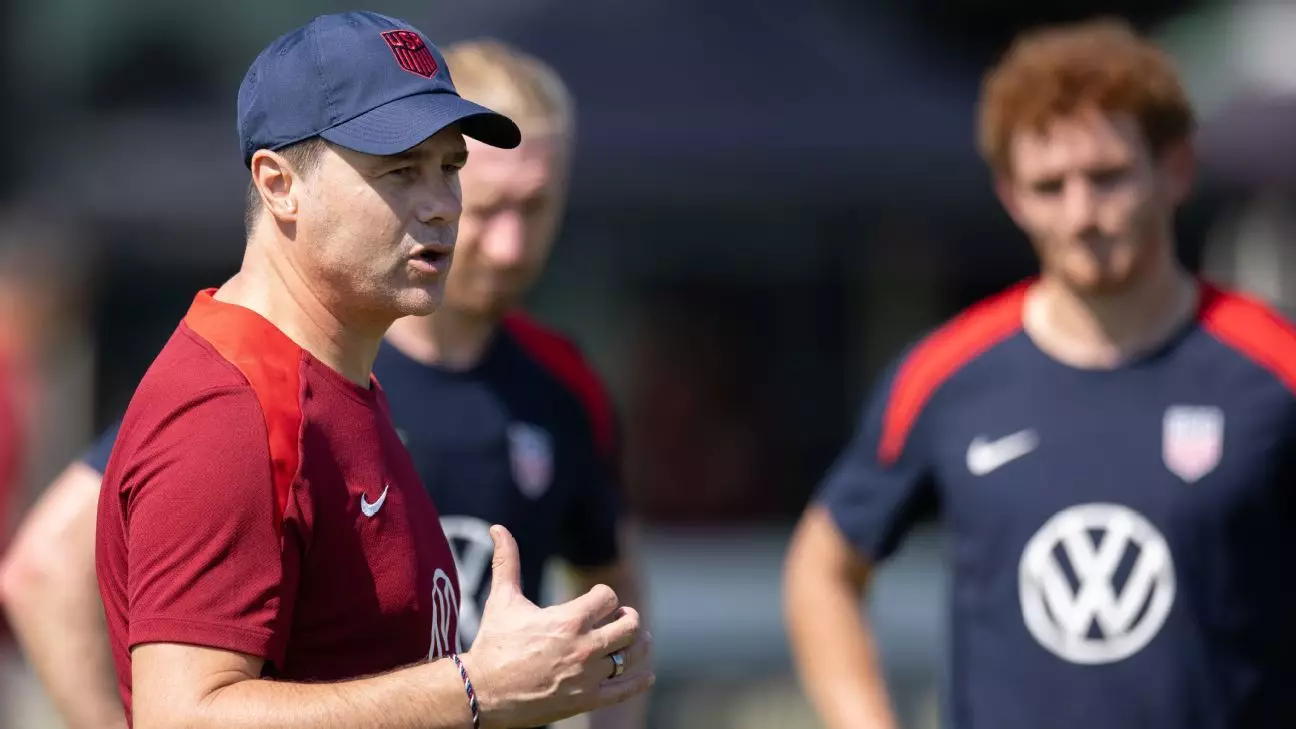As the United States gears up to co-host the 2026 World Cup alongside Canada and Mexico, there’s a palpable sense of expectation and responsibility among players, coaches, and fans alike. Head coach Mauricio Pochettino, tasked with guiding the U.S. men’s national soccer team to success, has voiced what many are feeling: the weight of this monumental opportunity is immense. The 2026 tournament does not just represent a major sporting event; it embodies a chance to elevate soccer’s profile in a nation where it still battles for recognition against the likes of football, basketball, and baseball.
In a recent roundtable discussion, Pochettino candidly described the situation as “a massive, massive responsibility.” This phrase encapsulates the challenges that lie ahead, as the team prepares to not only compete on an international stage but also to inspire an enthusiastic fanbase that is eager for success.
Reflecting on history, Pochettino is aware of the potential revitalization this World Cup can bring. The last time the U.S. hosted the tournament in 1994, it provided a significant boost to soccer, laying the groundwork for the establishment of Major League Soccer (MLS). The revenue and attention garnered from that event had lasting effects on the sport’s infrastructure and grassroots programs. Pochettino aims to harness that same fervor as the countdown to 2026 begins. His goal is to create an environment that can sustain soccer’s growth, beyond just the tournament itself, and he believes that passion can be reignited among fans and players alike.
However, Pochettino recognizes that this journey requires the collective effort of many. He has appealed to U.S. fans to rally behind the team, regardless of the ups and downs that may occur over the next two years. “Our responsibility is to provide something that can be exciting and enjoyable,” he emphasized. Pochettino fears that external pressures might hinder players’ performances, noting that too much stress can stifle their innate talents on the pitch. By alleviating these pressures and fostering a supportive environment, he hopes to bolster the players’ confidence.
The head coach’s focus on mental well-being is crucial, especially considering the recent struggles of the USMNT on the international stage. Fans recently witnessed a disappointing early exit from the 2024 Copa America and a crushing loss to Colombia. Such moments can foster negativity and lead to disillusionment among supporters. It is paramount, therefore, for Pochettino and the team to not only push through these challenges on the field but also engage fans in a way that renews their allegiance.
Looking ahead to the 2026 World Cup, Pochettino envisions a united front, one where fans feel a strong connection with the team and the sport. “Together, we need to build that confidence and trust,” he asserted. This vision transcends mere wins and losses; it is about establishing a culture of pride around soccer in the U.S.—a sport that has long been fighting for its place in the sporting hierarchy. He believes that instilling this sense of pride is crucial for the long-term sustainability of soccer in America.
As Pochettino prepares to lead the USMNT against Panama at Austin’s Q2 Stadium, the implications of this match extend far beyond a single game. It’s an opportunity to set the tone for what lies ahead. With a dedicated fanbase behind them, the team can embark on a journey of collective growth and achievement.
Ultimately, Pochettino’s vision for U.S. soccer revolves around one critical element: the fans. Their support is indispensable, not just for immediate results, but for the broader narrative of soccer’s future in America. “If not, it’s impossible,” he stated, underlining the vital role fans play in this equation. For soccer to rival the popularity of other sports in the U.S., a profound cultural shift is needed, powered by passionate supporters who will stand by their team in both good and difficult times.
As the nation prepares for 2026, the groundwork laid now will determine the legacy of this World Cup. Pochettino’s leadership, coupled with fan engagement, could pave the way for a renaissance in American soccer that celebrates the sport’s rich potential while forgiving its imperfect history. Through triumphs and trials, the journey promises to be as monumental as the tournament itself.

